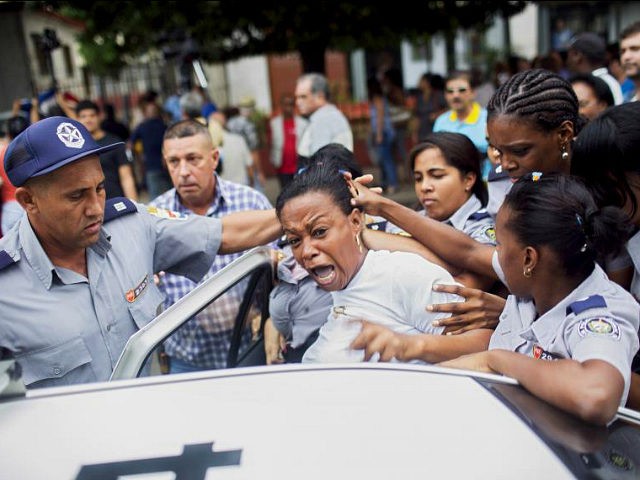The United Nations Office of the High Commissioner on Human Rights is set to review Communist Cuba’s record of forced disappearances. It is the first time such a review will occur following the death of dictator Fidel Castro, and it comes at a time in which dissidents warn oppressive police behavior against them is on the rise.
In an announcement this week, the UN said that Cuba, along with Ecuador and Senegal, will have their records reviewed by the UN Committee on Enforced Disappearances (CED). The three nations have signed and ratified the International Convention for the Protection of All Persons from Enforced Disappearance, which requires the UN to check their records. An enforced disappearance is a government abduction of an individual in which their relatives are not provided information as to where they have been apprehended or why. Those “disappeared” are rarely seen again.
The final reports on all three nations will be published on March 17.
The last time the UN commission reviewed Cuba was in 2012. That report, written by “a multidisciplinary working group made up of many government and/or State ministries and institutions, the National Assembly, NGOs and other relevant organizations,” heaped effusive praise on the community autocracy.
“The rights to life, liberty and security of person have always been mainstays of the Cuban Revolution, its authorities and society at large, even though Cuba has had to face over 50 years of aggression, terrorism and a harsh economic, commercial and financial embargo imposed by the Government of the United States of America,” the 2012 report reads. “There have been no cases of enforced disappearance in Cuba since the revolutionary triumph of 1959.”
The report goes on to claim that “the concept of holding a detainee or prisoner incommunicado is alien to criminal and procedural practice in Cuba.”
All three assertions – that Cuba respects the sanctity of life of its prisoners, that no disappearances have occurred in Cuba since 1959, and that Cuba has never held prisoners incommunicado – are demonstrably false. There is little reason to believe the 2017 update to this report will contain more believable challenges to the Communist regime, though all such reviews present an opportunity to condemn the authoritarian regime for its crimes.
The case of Hamell Santiago Maz Hernández, who died in late February, contradicts the claim that Cuba values the life of its people. Maz Hernández died after spending eight months in the notorious Combinado del Este maximum security prison, used to house political dissidents. The government claims cardiac arrest as the cause of death but his dissident organization, the Patriotic Union of Cuba (UNPACU), reject this assertion and have vowed an investigation. There is no evidence Maz Hernández received medical care while in the prison. He was facing the charge of “desacato,” or “disrespect” – a catch-all crime used against anti-communist protesters.
Another former inmate of Combinado del Este, Danilo Maldonado Machado, can testify to being held incommunicado. The artist, known by his pseudonym “El Sexto,” was transferred to Combinado del Este without his family being alerted. His fiance, he later said, only knew of his transfer because she arrived in time to see the van driving him away, and he was able to shout the name of the new facility to her. Maldonado, who was serving time without being charged following public celebrations of Fidel Castro’s death, later said he was beaten severely enough to trigger asthma attacks and not provided medical care.
A record also exists of forced disappearances since 1959, contra the UN report. According to Cuba Archive’s record of human rights crimes under the Castro brothers, at least 23 confirmed disappearances occurred between 1959 and 2014. One hundred other unconfirmed records exist. These numbers are low because, for most of its time in power, the Communist Revolution opted for openly executing its enemies via firing squad. Cuba Archive counts over three thousand firing squad executions and another 1,116 extrajudicial killings.
At the time of Fidel Castro’s death, the state had executed 5,775, including non-firing squad killings. Another 20,000 Cubans were believed to have died in the straits between Cuba and Florida, drowning in escape attempts from the island. Sixteen Cubans died while on hunger strike in prison; 209 died of health problems upon being denied medical care in prison.

COMMENTS
Please let us know if you're having issues with commenting.